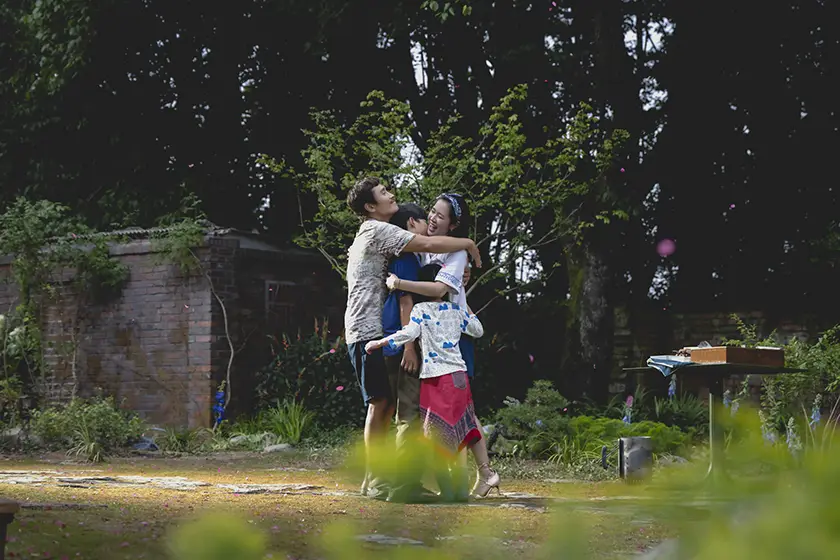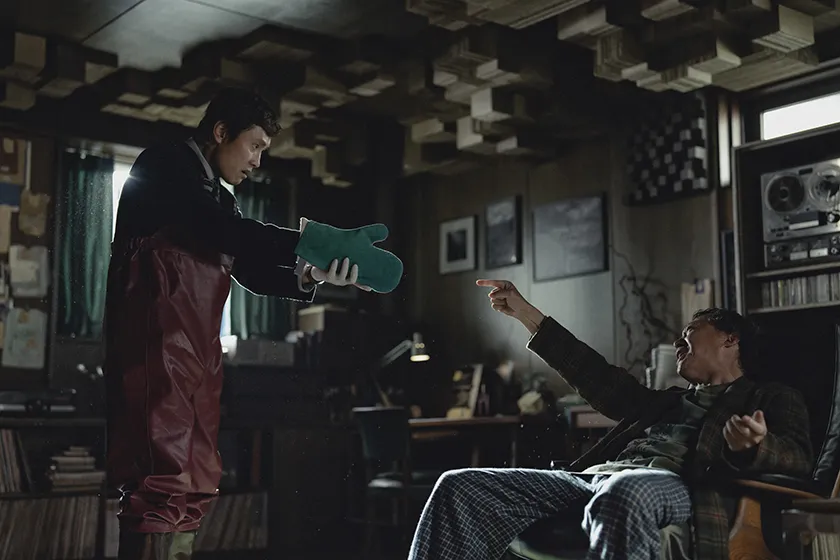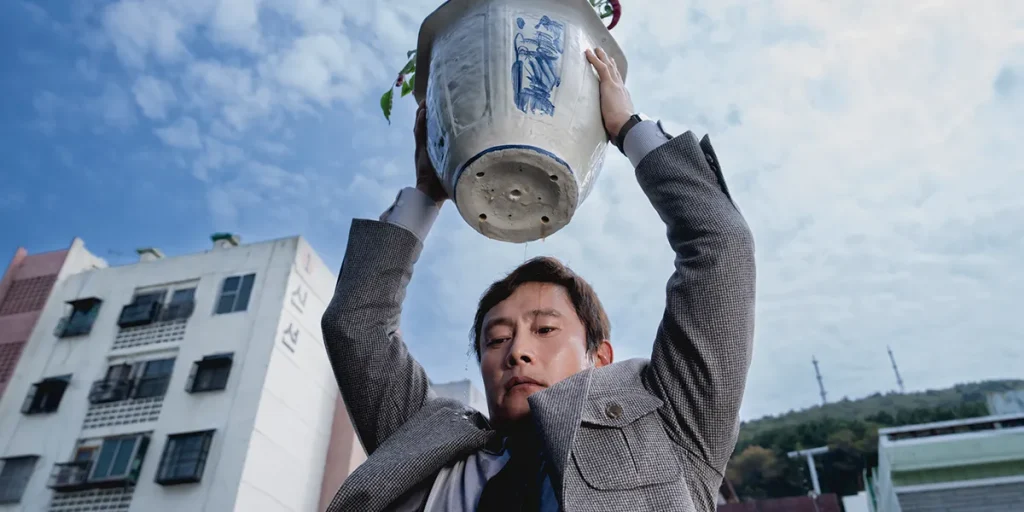Lee Byung-hun is superb in Park Chan-wook’s dark comedy-thriller No Other Choice, which smartly warns us against our impending loss of humanity.
Director: Park Chan-wook
Original Title: 어쩔수가없다
Genre: Dark Comedy, Thriller
Run Time: 139′
U.S. Release Date: December 8, 2025 IMAX Screening; December 25, 2025 in select theaters
U.K. & Ireland Release Date: January 23, 2026 in cinemas
“Do you know what I’m feeling right now?,” Man-su (Lee Byung-hun) asks his family, at the start of No Other Choice (Eojjeol Suga Eopda), adapted from Donald E. Westlake’s 1997 novel “The Ax” and previously made into a movie by Costa-Gavras. “I have it all,” he continues, looking up at the sky in gratitude and hugging his wife Miri (Son Yejin) and their two children Si-one (Kim Woo Seung) and Ri-one (Choi So Yul) tight, with their two golden retrievers merrily running around in their idyllic garden.
Man-su’s employer at Solar, the paper manufacturing company where he’s been working for many years, has just gifted him an eel to thank him for his hard work, and the entire family has been celebrating with a barbecue. It’s a happy family we see at the start of Park Chan-wook’s (Oldboy, Decision To Leave) new film, and that same happy family closes it too – only, with the dynamics between them irrevocably changed.
It all starts a few months later, when our protagonist is suddenly fired, despite his twenty-five years of experience. “We’re sorry. We have no other choice,” his employers tell him, explaining that Solar Paper was acquired and they have to make some cuts. Three months later, Man-su has a string of failed interviews to look back at but no job prospects whatsoever. With no mortgage to rely on and so many mouths to feed, the practical Miri makes a decision: they will get rid of their bigger car, their beloved house, and their dogs.
As potential buyers start coming around to see the house and the dogs are sent to stay with a relative, everyone’s lives change, particularly that of cello prodigy Ri-one, who was already struggling to express herself – her only form of communication consists of repeating other people’s phrases instead of formulating her own – and who retreats even further into her inner world. As Miri starts getting ready for the move, Man-su realizes there’s only one choice he can make.

The thing is, the competition is just too tough, and the opportunities too scarce. With only one real competitor to Solar Paper that could potentially take him on—the aptly named Moon Paper—he can’t risk them choosing someone else over him. But there’s a way to find out who might have better skills than he does, and Man-su is smart enough to carry it all out. Soon, a plan materializes for our well-meaning protagonist: he will get rid of the competition, so they’ll have no other choice but to hire him.
What makes No Other Choice so fascinating is that we’re not watching a cold, calculating murderer strategically planning his moves here, just like we’re not witnessing a victim becoming a hero. Sure, Man-su is highly intelligent and very logical, which gives him the ability to be more cold-minded than your average person, but he’s not evil. At the same time, he’s moved by the best intentions, but he’s not a saint either, as he’s fully aware of the choices he’s making. Yet there’s something about him that draws us to him — a goofiness in this ordinary man that makes him endearing and even relatable. Man-su keeps getting himself into absurd and even extremely violent situations, yet he has such little control over his own plan—just like we do on our own life—that we can’t help but empathize with him despite it all.
Thematically speaking, No Other Choice is more straightforward than most of Park Chan-wook’s previous films, but only deceptively so. With a simple but genius premise, the writer-director and co-writers Lee Kyoung-mi, Jahye Lee, and Don McKellar draw our attention to today’s employment trends and warn us against the risk of letting the apathetic, conformist and (quite literally) machine-like attitudes that are valued in the current job market from dehumanizing us in our real life too.
Despite tackling some very real and worrying issues, the film nails the balance between comedy and thrills, which is even more impressive considering the things Man-su is capable of doing, to both ours and his own surprise. Part of the credit goes to a screenplay that’s filled with unexpected twists till the very end, and where every single one of its many characters — not just Man-su and the men he targets, but everyone’s family members too, and even his own wife — eventually does something that forever alters our perception of them, opening up new worlds of possibilities.
But if the film is as empathetic as it is, it’s also due in no small part to Lee Byung-hun, who delivers a tour-de-force of a performance that demands our attention at all times. From the start of the movie until the very end, we get to see the many sides of a character whose moral code gets increasingly questionable, but whose empathy and innocence make us care for him deeply from the moment he enters the screen. It also helps that Man-su has a habit of getting into the most improbable situations, and Lee’s fantastic comedic timing gives us some truly hilarious scenes that lighten the mood at the right moment.

Son Yejin as Miri and Yeom Hye-ran as the wife of one of Man-su’s targets are the other standouts, and their two characters are those that surprise us the most throughout the film. But every single cast member plays their parts to perfection in a film where nothing is left to chance.
Technically speaking, the movie is impressive too, with stunning cinematography (Kim Woo-hyung) and inventive visual choices that are fully part of the storytelling. There’s a scene of Man-su at job interview where lighting is used to conceal the manager’s face in very entertaining and (pun intended) illuminating ways, and that’s only one of the many examples where the film uses the medium to its full advantage to achieve a unique effect. Flawless sound design (Kim Suk-won) and music (Cho Young-wuk) really help convey mood, even more so since it often comes from Ri-one’s own cello, and an irresistible soundtrack gives everything more rhythm.
When I first left my screening of No Other Choice, I was confused. On one hand, this felt like a much simpler film than what Park Chan-wook has gotten us used to, with a more surface-level approach to its themes than usual. On the other hand, I couldn’t stop thinking about Man-su and his adventures, and the similarities between this fictional world and our own. The more I think about the film, the more I find new themes to reflect upon, and appreciate Park’s smart storytelling choices. No Other Choice is only deceptively simple: there’s so much more than meets the eye in this gorgeous, unpredictable ride.
No Other Choice (어쩔수가없다): Movie Plot & Recap
Synopsis:
A man who has recently been laid off by his employer decides to increase his chances of getting a job by eliminating his competition.
Pros:
- Entertaining and unexpected, with twists that will keep you hooked till the end
- Perfect balance of dark comedy and humor
- A flawless central performance from Lee Byung-hun, and fantastic turns from the rest of the cast
- The film is only deceptively simple and ends up having much to say about our current job market and the risk of losing our empathy and humanity outside of work too
Cons:
- It will take you a while to really understand the movie
No Other Choice (어쩔수가없다) had its World Premiere at the Venice Film Festival on August 29, 2025. The film will open in select U.S. theaters on Christmas Day, after a Early Access one-day only IMAX screening on December 8, and nationwide in January 2026, and in U.K. and Irish cinemas on January 23, 2026.

